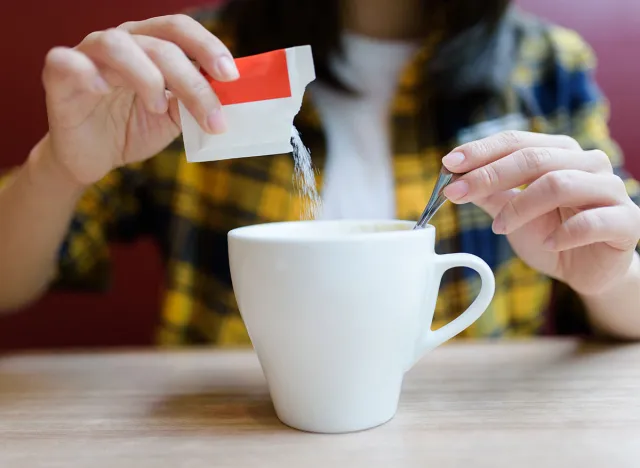If you need a cup of coffee to get your day started, you're not alone—in fact, you're in the majority. According to a study by the National Coffee Association, 62% of Americans drink some form of coffee every day. And while that coffee isn't necessarily unhealthy, but there are a few bad habits that can contribute to aging you faster if you drink coffee in certain ways.
Drinking coffee instead of eating breakfast.

Many say that breakfast is the most important meal of the day, so of course, replacing it with coffee can't be good for your overall health.
According to Moskovitz, "skipping this prime meal time can lead to a less nutritious diet", specifically one that goes against healthy aging.
Instead of skipping breakfast and going straight to coffee, Moskovitz suggests "a breakfast consisting of fresh fruit, whole grains, and nuts or seeds" for a breakfast packed with fiber and antioxidants.
Taking your coffee light and extra sweet.

If you're not about drinking your coffee black and would rather add in creamers and sweeteners, fair warning: it could affect your health, depending on how much you add.
"Moderate amounts of sugar in your diet is okay, but going overboard with sugar packets every time you need a pick-me-up may stack up overtime," says Moskovitz.
Specifically, as you age, you could be looking at a major increase in blood sugar, inflammation, and many other health conditions.
Drinking coffee instead of water.

Remembering to drink water is a habit that many often forget, but when you're drinking lots of coffee, it can be a recipe for dehydration and disaster when it comes to your overall health.
According to Moskovitz, forgetting to chase your caffeine with water, "can lead to dehydration that can negatively impact your skin, digestion, energy levels, nutrient absorption, and even joints."
Drinking coffee throughout the day—and night.

When it comes to choosing when to drink your coffee—do your best to stick to the morning. Even if caffeine doesn't keep you awake late at night, that doesn't mean you should be drinking a cup right before bed.
According to Moskovitz, "caffeine is a stimulant that when consumed too close to bedtime, will disrupt adequate rest. Poor sleep can wreak havoc on recovery, immune system, mood, energy, metabolism, and everything in between."
Using artificial sweeteners.

Here's the deal with artificial sweeteners—even if it may seem like it's a good idea to swap them into your coffee rather than sticking with the real stuff, they actually have a serious impact on your long-term health.
According to Moskovitz, "not only are [these sweeteners] nutritionally void, but non-nutritive sweeteners such as sucralose and aspartame can harm insulin levels, gut health, which influences all vital pathways in the body, and lead you to crave more sweets in general throughout the day."
No comments:
Post a Comment